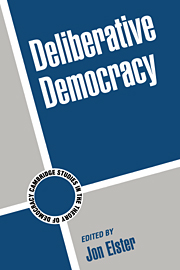Book contents
- Frontmatter
- Contents
- List of Contributors
- Preface and Acknowledgment
- Introduction
- 1 “Claro!”: An Essay on Discursive Machismo
- 2 Deliberation as Discussion
- 3 All Men Are Liars: Is Democracy Meaningless?
- 4 Deliberation and Constitution Making
- 5 Pathologies of Deliberation
- 6 Deliberation and Ideological Domination
- 7 Arguing for Deliberation: Some Skeptical Considerations
- 8 Democracy and Liberty
- 9 Health-Health Trade-offs
- 10 Full Representation, Deliberation, and Impartiality
- Index
7 - Arguing for Deliberation: Some Skeptical Considerations
Published online by Cambridge University Press: 05 June 2012
- Frontmatter
- Contents
- List of Contributors
- Preface and Acknowledgment
- Introduction
- 1 “Claro!”: An Essay on Discursive Machismo
- 2 Deliberation as Discussion
- 3 All Men Are Liars: Is Democracy Meaningless?
- 4 Deliberation and Constitution Making
- 5 Pathologies of Deliberation
- 6 Deliberation and Ideological Domination
- 7 Arguing for Deliberation: Some Skeptical Considerations
- 8 Democracy and Liberty
- 9 Health-Health Trade-offs
- 10 Full Representation, Deliberation, and Impartiality
- Index
Summary
Introduction
Political theorists regularly lament the absence or the demise of deliberation within U.S. political institutions. Would-be political reformers of various persuasions urge deliberation upon us. Yet in their pleadings such theorists and reformers frequently invoke deliberation in an uncritical manner. They proceed as though the ways in which deliberation might operate and the effects we can expect of it are not just obvious, but attractively so. I, in fact, find deliberation intuitively appealing. But intuition is insufficient and I am skeptical of uncritical invocations. I here explore some important points at which the intuitive attraction of deliberation needs to be supported by arguments.
Advocates of deliberation, usually tacitly, sometimes explicitly, presume that deliberation, because it centrally involves reasoned discussion, obviously is superior to other modes of political decision making. “The alternatives to deliberation,” we are told in one forthright endorsement of this view, “are less moral or more authoritarian ways of dealing with fundamental moral conflicts concerning social justice, by a presumed cultural consensus, non-deliberative procedures, political deals, or threats of violence.” How are we to make sense of claims of this sort? My aim in this essay is to suggest that the answer to that question is not obvious.
The case for deliberative democracy, as typically formulated, comes in two main variants. First, there are exercises in retrieval, which seek to interpret or reinterpret existing legal and political arrangements in ways that highlight their tacit or suppressed deliberative dimensions.
- Type
- Chapter
- Information
- Deliberative Democracy , pp. 161 - 184Publisher: Cambridge University PressPrint publication year: 1998
- 37
- Cited by

